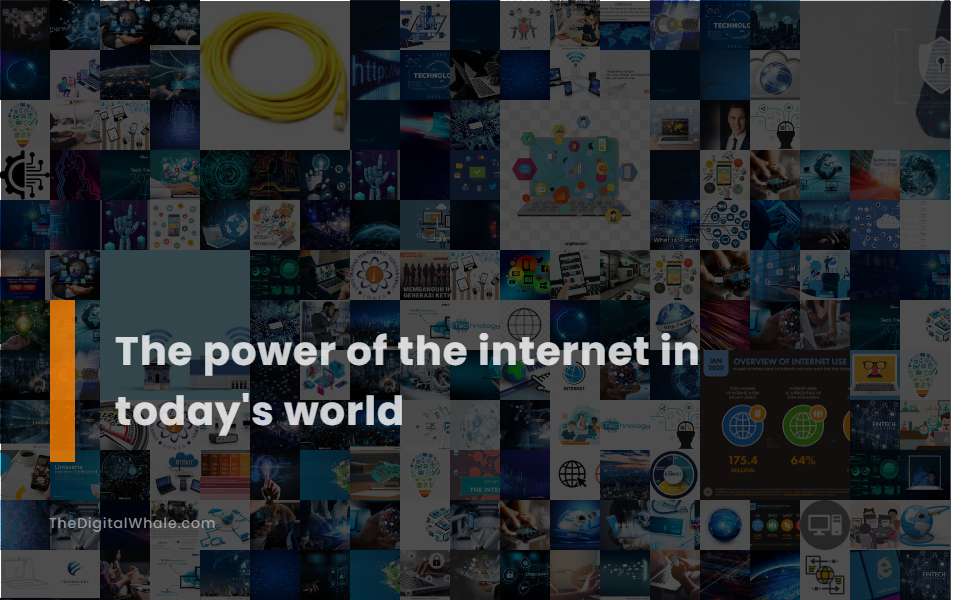The Power of the Internet In Today's World
What are the benefits of using the Internet for social activities? What are the benefits of the internet in life? Let's find out more about The Power of the Internet In Today's World.

Global Communication: Instant and effortless connection with people worldwide through social media, email, and instant messaging.
The Internet revolutionizes global communication by enabling instant and effortless connections through social media, email, and instant messaging, fostering international engagement, transforming crisis communication, and serving as a vital space for interpersonal interactions across the globe. For more insights, explore its impact on Global Communication, where you can discover the numerous ways the Internet has become indispensable in today's interconnected world.
Access to Education: Online courses, certifications, and a vast array of educational resources available from anywhere.
The Internet has revolutionized education by providing unparalleled access to knowledge, enabling students to explore a wide range of subjects through online courses, certifications, and a vast array of educational resources available from anywhere, beyond the traditional classroom or library.
Remote Work and Freelancing: Flexibility and autonomy in careers with the rise of the gig economy and work-from-home options.
The rise of the gig economy, fueled by internet technology, has significantly enhanced flexibility and autonomy in careers, allowing gig workers to decide their working hours, locations, and types of work, thereby improving their job satisfaction and workplace well-being. Digital marketplaces and platforms, as discussed in The Gig Economy: How Technology is Reshaping Work and Business, have enabled freelancers to find job opportunities globally, work remotely, and maintain a better work-life balance, offering flexibility and independence that traditional employment often lacks.
Financial Services: Easy management of finances through online banking, cryptocurrency, and e-wallets.
The internet has revolutionized financial services by enabling easy management of finances through Online Banking, allowing users to conduct transactions, manage accounts, and monitor finances 24/7. Additionally, platforms like PayPal and crypto-friendly banks facilitate the use of cryptocurrencies and e-wallets, enhancing convenience and security in financial transactions.
Entertainment: Access to movies, music, games, and online gaming tournaments from home.
The Internet has revolutionized entertainment by providing global access to movies, music, and games. It enables live-streaming of video games, participation in online gaming tournaments, and the discovery of content from around the world, transforming how people consume and engage with various forms of entertainment. This seamless connectivity has brought unprecedented opportunities for both creators and audiences, reshaping the landscape and experiences of digital amusement across the globe.
Related:
What are the negative effects of social networking on people's social lives? in what ways has modern technology made us less sociable? Let's find out more about Is Technology Making Us More Or Less Social?.
E-Commerce: Shopping from home with the ability to compare prices, read reviews, and get home delivery or pickup options.
E-commerce revolutionizes shopping by allowing consumers to shop from home, compare prices, read reviews, and opt for home delivery or pickup. This transformative approach not only enhances consumer convenience but also provides businesses with global market reach, cost savings, and enhanced customer insights. By leveraging the power of the internet, businesses can broaden their audience base and create a more personalized shopping experience. For more insights on how e-commerce benefits your business, explore the resources available at Like Us. This growing trend emphasizes the importance of adapting to changing consumer behaviors to remain competitive in a digital age.
Information Access: Infinite source of information on various topics, including news, books, and journals.
The internet has become a vital source of information, providing unparalleled access to a vast array of topics, including news, books, and journals, which is crucial for the free flow of information and the health of democracies worldwide. For more insights, visit the UNESCO website that delves into the significance of digital access in today's world.
Digital Divide: Uneven access to the Internet, with disparities between high- and low-income countries and regions.
The digital divide persists, with significant disparities in Internet access between high- and low-income countries. In low-income nations, only a small fraction of the population benefits from fixed-broadband subscriptions, underscoring the severity of this divide. Astonishingly, [ITU](https://www.itu.int/en/mediacentre/Pages/PR-2023-11-27-facts-and-figures-measuring-digital-development.aspx), indicates that 2.6 billion people, or one-third of the global population, remain offline due to high prices and lack of infrastructure. This highlights the urgency for global initiatives aimed at bridging this gap, ensuring equitable access to the digital world for all.
Internet of Things (IoT): Integration of devices with sensors and software to enhance communication between people and objects.
The Internet of Things (IoT) integrates devices with sensors, software, and network connectivity, enabling them to collect and share data, communicate with each other, and perform various tasks autonomously. This technology significantly enhances communication between people and objects in diverse settings, ranging from smart homes to industrial systems. To delve deeper into the transformative influence of IoT and explore its applications, visit the IBM Think website where insights and developments about IoT are continually discussed.
Mobile Internet Connectivity: Increased mobile internet users, but with persistent gaps in coverage and usage.
Despite the significant growth in mobile internet users, with 63.38% of website traffic coming from mobile devices and 4.6 billion people using mobile internet, there are persistent gaps in coverage and usage, affecting 3.45 billion people. These gaps are primarily due to barriers such as device affordability, lack of digital skills, and limited access to critical infrastructure. For more insights into these challenges, visit the New GSMA Report that highlights the ongoing efforts to bridge this digital divide globally.
Related:
What are the chances of artificial intelligence crossing the line and becoming fully self-aware? What are some potential implications of robots taking over many job roles in the future? Let's find out more about Should We Be Worried About Ai and Robotics?.
